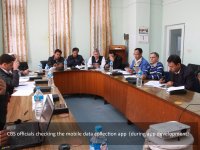Decidim est une plateforme numérique imaginée par la mairie de Barcelone dès 2016 pour créer et coordonner des espaces et des processus participatifs, qui vise à étendre et faciliter l’accès à la participation citoyenne en vue de la co-construction et de la co-production des politiques publiques. Il s’agit d’un projet européen open source : son code est ouvert et libre ; en d’autres termes, tout le monde peut le voir, l’utiliser, le copier ou l’enrichir.
Innovation Tag: Digital and Technology Transformation
We have launched the Citizens’ Packet to make Silesian Voivodeship Office (SVO) a more friendly and serviceable place for users. The core of the packet consists of practical facilitations for our clients who seek information or help. Our client-oriented solutions comprise diverse solutions on every level of our customer care and spread to every organisational unit in the SVO.
The Citizens’ Packet is available online via our brand-new official website.
The Ministry of Economic Development and the National Clearing House implemented a program to promote cashless payments in public administration. Our goal is to develop a model for acceptance of non-cash payments using point of sale (POS) terminals and enable the use of virtual terminal (WebPOS Paybynet) in public sector, which is free for both the administration and the citizens.
Innovative use of digital and online opportunities has made it easier for people to have a greater say in local decision-making in Scotland. A unique cross-sector collaborative approach was taken to developing digital, with collective solutions and sharing of learning achieved through an open, iterative and experimental methodology. The Scottish Government encouraged rapid growth of participatory budgeting and digital, in line with the ambitions of open government and strengthening democracy.
In the labour and social services administration, the Trelleborg municipality uses the help of a case handler program to automate certain parts of processes that concern for example processing of financial assistance. The result is less administration and more time for core services.
Predictiv is a web platform that enables governments to test whether new policies and interventions work with an online population before they are deployed in the real world. The tests take 1 to 2 weeks to complete, enabling policymakers and Ministers to get answers to questions that would have taken months (or years) to answer in the past.
In April 2015, a 7.8 Mg earthquake hit Nepal that affected over 1 million households and 5.08 million people. Disbursement of reconstruction funds called for a massive door-to-door survey in order to identify true beneficiaries. For the first time, Nepal and the Kathmandu Living Labs deployed a team of 3,000 engineers armed with electronic tablets to collect 10 TB data and 10 million photographs from remote parts of Nepal in just over 120 days.
The Better Government Movement (BGM), housed on Innovation.gov, builds a 21st century, delivery-driven government. BGM creates an inclusive space where public servants can grow their creative capacity and learn new tools, approaches, and mindsets to jumpstart innovation. This is in service of solving government-wide problems and affecting positive change within agencies and government writ large.
GOV.UK Verify is a secure way for people to prove who they are online. It enables people to create a ‘digital identity’ that can be trusted by public or private sector organisations. We have worked to align and map identity standards and ensure that GOV.UK Verify can be internationally interoperable.
CivTech is the Scottish Government’s challenge programme for innovation. The programme pioneers a smarter, faster approach to public procurement to harness entrepreneurial tech innovation and citizen engagement, improving public service delivery, creating economic development opportunities and fostering an entrepreneurial mindset within government.


